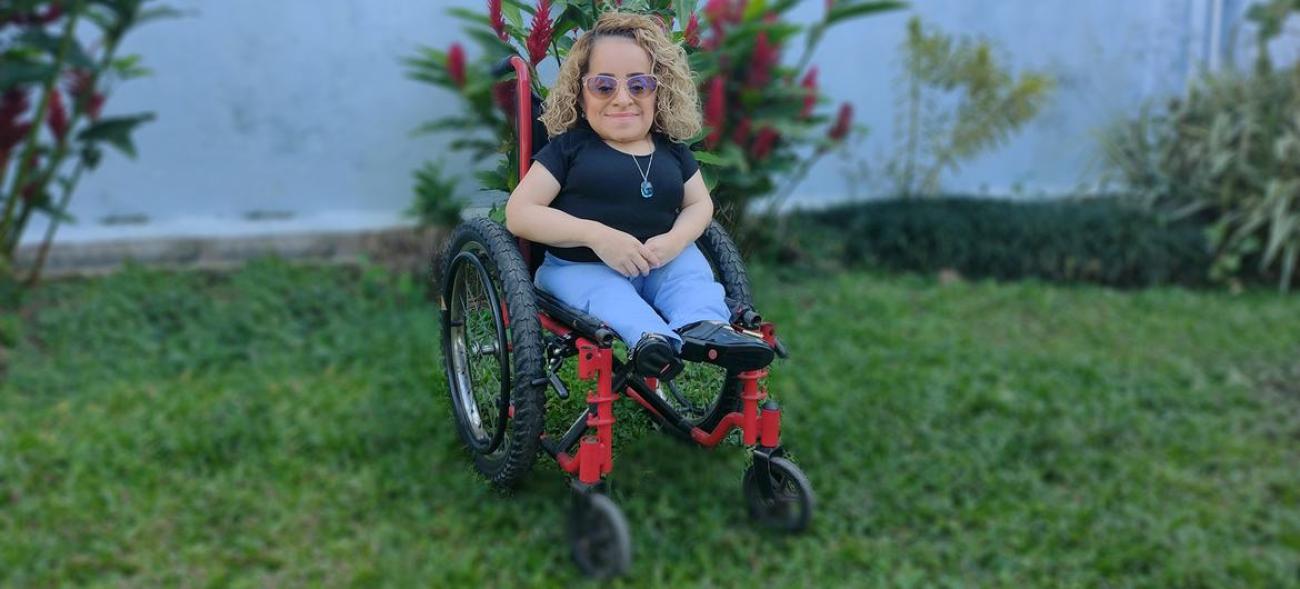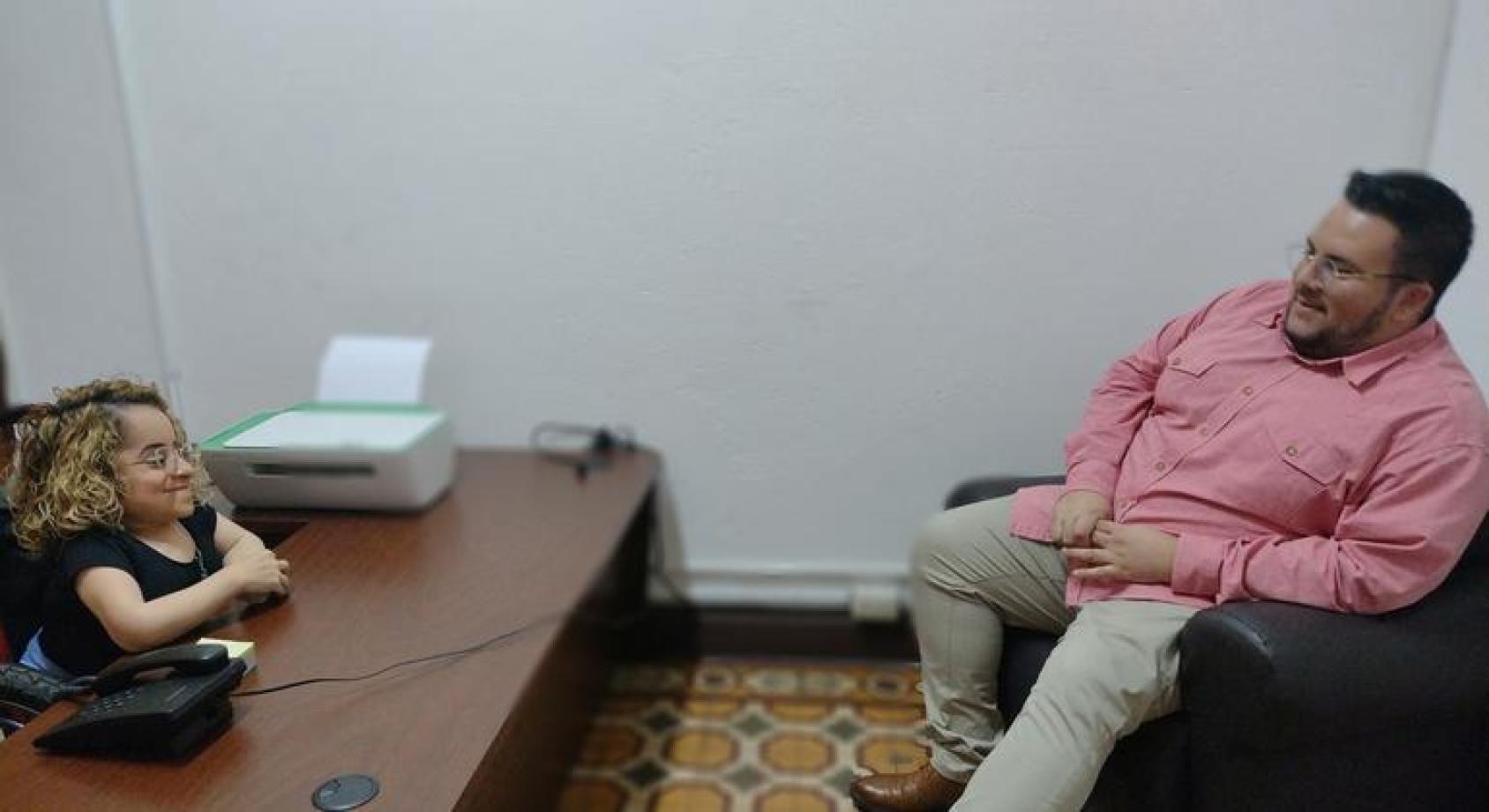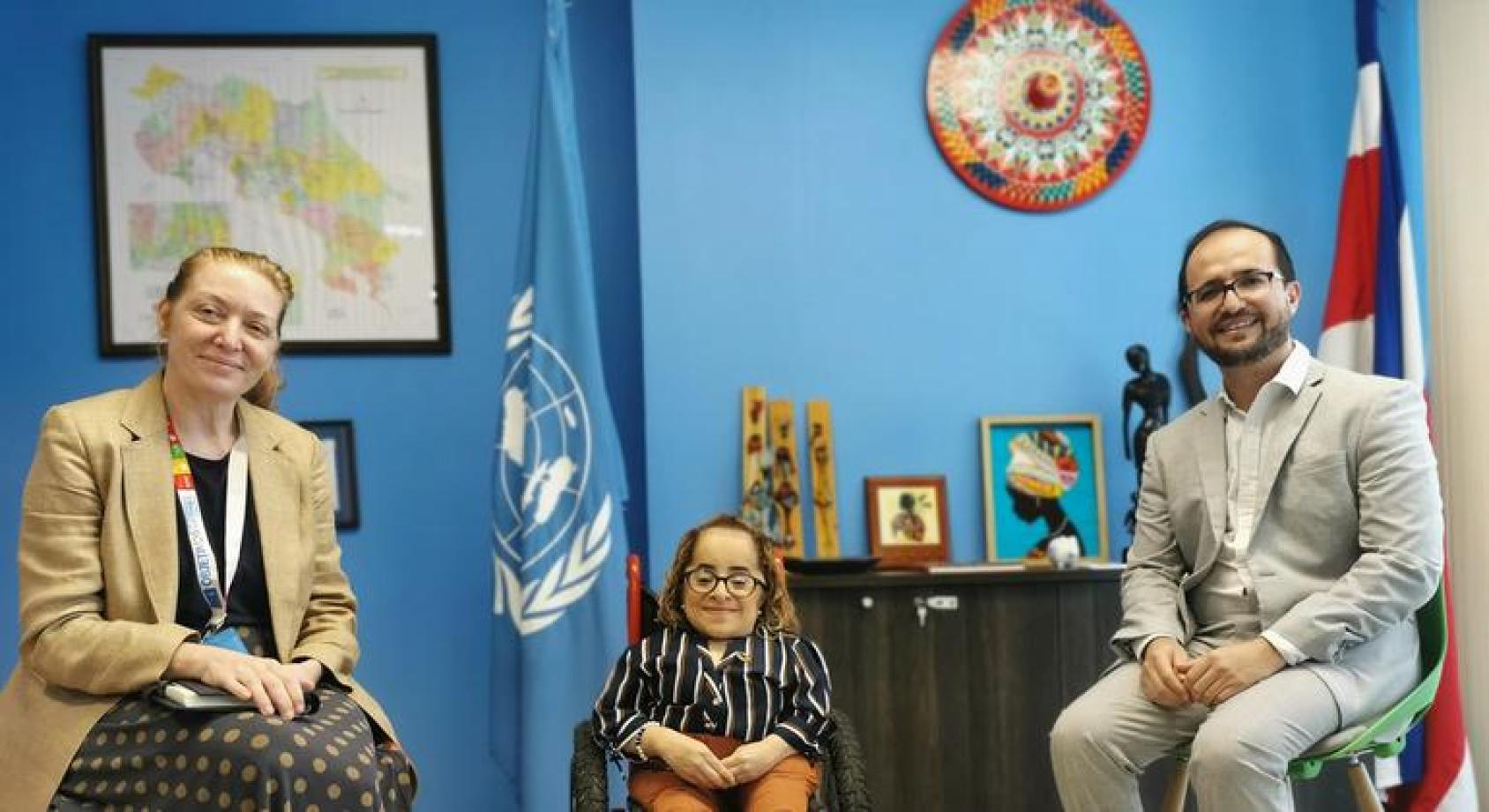'It's society, not disability, that puts barriers in your way,' says Costa Rican activist

“I am the daughter of a housewife and an automotive painter,” is how Nicole Mesén, a Costa Rican activist for the rights of people with disabilities, defines herself behind her desk in the office of the municipality of Goicoechea. She was born with osteogenesis imperfecta, a condition in which bones fracture easily and which also causes damage to muscles, teeth, spine, and hearing. In addition to impeding her mobility and having to use a wheelchair, Nicole has suffered more than 100 fractures throughout her life.
"Being born with a disability is complex, not because of the disability itself, but because of all the barriers that society generates. Historically and culturally, society has generated an idea of what a person should look like, and if someone breaks that model what we do is segregate that person and generate endless barriers, because we have built society with that model," she explains.
For instance, she recalls that she was unable to attend preschool because there was not enough knowledge about the rights of people with disabilities, which also led to discrimination.
However, in elementary school, Costa Rican Law 7600 on Equal Opportunities For People With Disabilities was already in effect, so her mother, Liliana, went to the Ministry of Public Education and fought for her daughter's rights. That is how she managed to get into school.
Her time at the elementary school led the school staff and students to create an environment of inclusion around her. At that time, Nicole was using a wheeled crib that her father had made to help her move around, as she was unable to sit up because of her condition. It was then that the change within the institution began to be noticed, and school's infrastructure became much more accessible.
“It seems to me that this was like setting a benchmark in the institution where I studied, because there had never been such level of inclusion as it was generated with me at that time,” Nicole recalls.
Because of health issues, Nicole did not receive a high school education when she should have, but she did not stop learning during that period of her life. Nicole studied painting and English, and learned to make handicrafts and costume jewelry.

But what does it mean to have a disability in Costa Rica?
According to official data, more than 18% of Costa Rican population has a disability, which is equivalent to more than 670,000 people. Of the total number of people with disabilities in the country, 39.1% are men and 60.9% are women.
Although more than 88% of this population has access to social security, Costa Rica still faces significant challenges to ensure their right to education and work. For instance, just 5.7% of the population with disabilities ageing 18 years or older attend formal education, and 95.5% attend educational centers that do not have support related to curricular adaptations. In addition, 55.4% of the educational centers they attend are not accessible.
On the other hand, 56% of people with disabilities aged 18 or older are unemployed.
Activism and politics go hand in hand
At the age of 18, Nicole became an activist for the rights of people with disabilities. She turned to social media because it was easier than going out on the streets. “I decided to do it from my own privilege, because even and with all the barriers I had to deal with, I had a mom who gave me all the tools. She showed me the Law 7600 when I was only 7 years old, and told me: Learn to assert your rights because no one is going to do it for you.”
At the age of 22 she became the first person with a disability elected as councilor of Goicoechea, municipality of the capital San José, a position she currently holds, at the age of 29.
“I looked at politics as a platform to make more visible the activism that I had already been doing, because I have always believed that activism and politics go hand in hand," Nicole says.
But she does not settle for what she has accomplished so far. Nicole wants to become a lawyer to defend human rights and to continue being an activist. That is her greatest motivation, because activism, she says, does not represent colors nor a political position, that may be temporary.

‘This is my story’ UN publications
Nicole's experience is an example of struggle and overcoming, as well as those of another twenty people who have partnered with the United Nations to produce the book "I am a person with a disability in Costa Rica and this is my story".
This publication is part of a series of stories that the United Nations has compiled in Costa Rica to make visible the situation of specific people and groups so that their desires, struggles, experiences, and important life lessons can be known.
The first publication of this series recognized and amplified the voice of people of African descent. The next one was on indigenous people. Nicole’s story is included in a third publication, focused on people with disabilities. In the coming weeks, the UN Office in Costa Rica will launch another book with stories of migrants.
Allegra Baiocchi, the UN's Resident Coordinator in Costa Rica, highlights that there are currently people with disabilities, families, communities, institutions, and organizations that are leading a transformation that puts people as the main and ultimate goals of development.
"It is a great challenge for the UN, States and societies in general, to support this and other groups who have lived in exclusion, who have had to face extremely complex struggles. It is all about listening to them, supporting them, and reaffirming their aspirations for equality and social justice as valid,” said Baiocchi. “We are learning every day how to ensure true inclusion and accessibility for all people. Representativeness is key, getting more people with all types of disabilities into employment and leadership positions,” she adds.
"This publication is a recognition for people with disabilities, who inspire and encourage us to fight for equity, rights and welfare for all. They teach us that we will not achieve Sustainable Development if we do not close the gaps and lags that are affecting them much more strongly than the rest of the people in Costa Rica", concludes the UN Resident Coordinator.
The Vice President of the Republic of Costa Rica, Mary Munive, participated in the launching activity of the publication, and she was highlighted by the UN as a strategic partner to provide solutions and answers to the concerns and needs of people with disabilities and other groups excluded from development opportunities.
“This presents us with a challenge: to move towards a more inclusive country with more opportunities for all people. This is precisely one of the commitments we have as a government. We must ensure that our population with disabilities has access to quality education and jobs, allowing them to develop as a whole person,” the Vice President highlighted.
How the UN is supporting
In addition to the publication, the United Nations has worked on different initiatives in Costa Rica to promote the inclusion and rights of this segment of the population.
The organization has prioritized the implementation of the Secretary General's Disability Inclusion Strategy in Costa Rica, promoting advocacy, evidence generation, and key information for decision-making.
For example, under the leadership of the UN Population Fund (UNFPA) and in partnership with the National Women's Institute, the National Council for Persons with Disabilities and the Latin American Alliance of Women with Disabilities, methodological tools were developed to train women with disabilities on sexual and reproductive health issues from a human rights perspective.
Moreover, the Fund presented the study “Sexual and Reproductive Health and Gender-Based Violence of Women with Disabilities," which showed that the population of women with disabilities is the most prone to experience different types of violence.
The UN office in Costa Rica, through the Disability Inclusion Initiative promoted by the Development Coordination Office (DCO), participates as a pilot country with the collaboration of its agencies, funds and programs. Thus, it promotes a comprehensive review of its materials, websites, procurement, talent attraction procedures, physical facilities, among others, to ensure that they are accessible to persons with disabilities. It also develops measurements and mechanisms to ensure that the needs of people with disabilities are included in its plans and projects.
This story was written by the UN Costa Rica team, and first published in Spanish by UN News and translated to English by DCO.
To learn more about the UN in Costa Rica's work on the ground, please visit: costarica.un.org.













